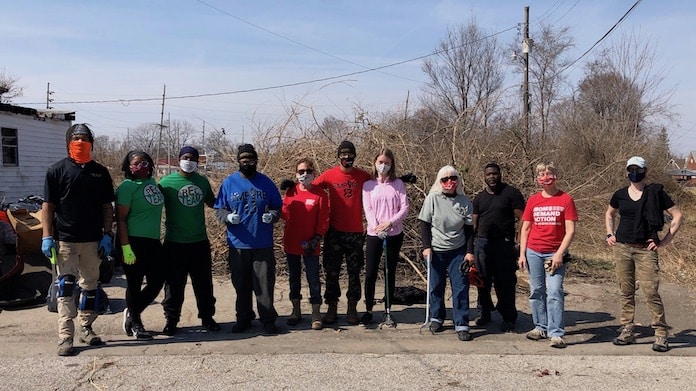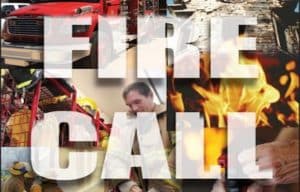Columbia woman pitching in to help East St. Louis

Over 100 years after the 1917 East St. Louis Riot, one Columbia resident is joining calls for reparations for that city, stating it would reduce gun violence and in turn benefit Monroe County.
For Cindy McMullan, 2012 was a personal wake-up call. In April of that year, a local student committed suicide with a firearm. Three months later, images of grieving parents and loved ones flooded the news cycle after a teen gunned down moviegoers in Aurora, Colo.
Eventually, the carnage reached a tipping point to where McMullan knew she had to make a difference.
“I began to think that there were more and more of these mass shootings going on and it seemed to be hitting closer and closer to home, so I began to think ‘Something needs to be done,’” she explained. “Then on Dec. 14 that year we had the Sandy Hook shooting and all those kids and staff were murdered in their classrooms. That was it – I knew I had to get involved, so I started searching.”
The Columbia woman’s search yielded minimal results, yet she was not the only one looking for ways to stop the violence. Another mom’s empty-handed search sparked Moms Demand Action for Gun Sense in America.
“There was nothing out there until Shannon Watts, another mom, did the same thing. She started looking for (a group) like Mothers Against Drunk Driving, only something that was for gun violence, and she couldn’t find anything so she started a Facebook page,” McMullan said. “That grew and grew and grew and then people began to meet offline and we began to form groups and chapters. I actually started with the St. Louis group when they started.”
Today, Moms Demand Action has chapters in all 50 states and D.C., and each chapter has local groups. McMullan formed a local group for the metro-east. Following the 2018 Marjory Stoneman Douglas High School shooting, droves of fed-up citizens began joining, and McMullan was asked to be a local group manager.
In this volunteer lead position, McMullan supports seven groups across central and Southern Illinois.
While Moms Demand Action largely focused on mass shootings when it began, its members quickly learned these highly publicized shootings account for a very small percentage of gun violence in the country.
McMullan said suicides are responsible for the largest percentage of gun deaths, followed by homicides.
“We have a lot of gun violence in our cities and so we started focusing on the city gun violence, and of course here in the metro east area we have a city that is very heavily impacted by gun violence, which is East St. Louis,” McMullan said. “So, for the last four years or so, we’ve kind of been focused on doing what we can to help East St. Louis.”
McMullan found many existing organizations within the East St. Louis area that are committed to rebuilding and strengthening their community.
Moms Demand Action began forming partnerships with these groups, including Empire 13, a grassroots organization largely focused on reversing environmental racism through its Boots to the Streets Campaign community clean-ups.
McMullan said environmental racism, which describes how factors such as lack of infrastructure, job opportunities and clean environment are systematically used to oppress black communities, plays a big role creating conditions that harbor gun violence.
In turn, she said Empire 13’s community clean-ups can help prevent gun violence.
“When we’re talking about (reducing) city gun violence, there are a lot of different strategies, and one is called CPTED – crime prevention through environmental design,” McMullan explained. “It is basically going in, cleaning up an area, clearing out the underbrush where people could hide or whatever … lighting areas up … and that also includes community gardens.”
Recently, McMullan also participated in Empire 13’s recent Reparations Now March, which honored the lives lost in the 1917 East St. Louis Race Massacre and called for reparations. Empire 13 is circulating a petition with specific demands to help restore East St. Louis decades after the massacre.
“I define reparations as not payment, but it’s what we’re owed,” Empire 13 founder and head organizer J.D. Dixon explained. “It’s not just money, but it’s to bring equity back to the black community because the infrastructure of the black community was destroyed by systemic racism and over a dozen race massacres that happened after slavery was abolished. So, reparations is to rebuild the infrastructure of the black community, and that’s through businesses, homes, agriculture and currency as well.”
McMullan and Dixon said because reparations involve bettering the community as a whole – as well as individual community member’s lives – they too will help reduce gun violence. In order to begin to understand this connection, McMullan said one must know how gun violence disproportionately impacts communities of color.
“Gun homicides (are) a universal American threat, but the majority of gun homicide victims are black Americans. They are 10 times more likely than white Americans to die from gun homicides,” McMullan said. “For black youth it’s even worse: black children and teens are 14 times more likely to die from gun homicides than their white counterparts, so this is a threat that disproportionately impacts black Americans, and that’s because it’s very localized … into specific communities and neighborhoods, and those are largely African American communities of color that have been disinvested in due to racism and all of that.”
Dixon explained reparations would provide residents of East St. Louis with the same opportunities afforded to predominantly white communities, which he said will in turn quell gun violence.
“It changes the circumstances,” Dixon said. “They will have more opportunities to make a business, or have more job opportunities that will keep them out of the streets and keep them out of that life.”
Andrew Theising, author of multiple books about East St. Louis and professor of political science at Southern Illinois University Edwardsville, said some East St. Louisans did receive reparations roughly four years after the riot, thanks to the Illinois Anti-Mob Violence Law. This law was in response to lynchings of the time period and stated if law enforcement could not protect a citizen from mob violence, the respective state or county must pay for human damages.
Theising’s research found there were two categories people could use to claim these 1921 reparations. One could receive up to $5,000 if a relative in their household lost their life in the violence, and they could also receive monetary compensation for loss of property.
Theising said these claims were paid out to both black and white East St. Louisans, and according to a local newspaper at the time, more than 130 claims were submitted totaling approximately $187,000 in compensation.
Because it took four years for the city to sell bonds to pay for the reparations, Theising said these reparations probably did not benefit nearly as many individuals as they could have.
“Honestly, it was probably too little, too late,” Theising said. “Who is going to wait around? In those days, women did not have many work options, so if I’m a widow living in East St. Louis and the breadwinner of my household was killed, am I going to wait four years to get some money? I’ve got mouths to feed right now, in 1917, what am I going to do? Of course I am going to pick up and I’m going to move with family, I’m going to go to a different city, I have to do something different.”
Dixon said due to the magnitude of lives and property lost, these past reparations were grossly inadequate.
“It was nowhere close to being adequate for what transpired, especially with them trying to say only a dozen or so people were killed when it was well reported it was well over 100; some reports say 150,” Dixon said. “Not just that, it’s (also because) the generational loss that happened, it’s businesses that were burned down that could have been Fortune 500 companies or still be around right now, it’s the homes that could’ve been passed down from generation to generation, so even the criteria they used was wrong in their assessment of their reparations, however it came out. It’s not adequate for what transpired and what transpired even after (the riot) due to systemic racism.”
Reparations, combined with on-site community support, is a combined effort to reduce East St. Louis gun violence by Empire 13, Mom’s Demand Action and Metro East Organizing Coalition. A large part of MEOC’s work involves going directly into gun violence hot spot neighborhoods and providing support.
They have hosted many events, including clothing help desks and town halls with law enforcement to discuss the problem. Moms Demand Action has been present at many – if not all – of MEOC’s events.
MEOC Executive Director Larita Rice-Barnes said having a positive, resourceful presence on the streets can make all the difference. One large part of this is the organization’s Peace Walks through gun violence hot spots.
“Increasing positive presence is part of our Gun Violence Prevention strategy, that and getting to know their needs,” Rice-Barnes said.
Even though East St. Louis is not in Monroe County, McMullan said the economic benefits gained through reparations as well as other ways of supporting East St. Louis would spill into Monroe County.
“Number one, we’re all part of the metro-east area and I think if we want to have a healthy, thriving area in the metro-east, East St. Louis could be a very important part of that. We could make it thrive. It was thriving at one time, and it could be thriving again and I think that could help all of us all around economically,” McMullan said.
She also shared while many purchase guns to protect their homes, these guns are more likely to be used to commit suicide than fend off an intruder. She said reparations would help the stigma of East St. Louis being unsafe to dissolve, therefore lessening the perceived need to keep guns in homes.
“How do you get people in safe, suburban rural areas to understand the impact that city gun violence has on them (when) they don’t see it?” McMullan pondered. “We all pay for it through lives lost and medical costs. And then just the feeling of security, I think a lot of people feel they have to have guns in their homes for protection because they’re afraid that it’s going to spill over into their communities.”
For more information on how to become involved with Moms Demand Action, visit momsdemandaction.org/act/. To learn more about Empire 13, visit their Facebook page or view their petition titled “Reparations Now for East St. Louis Residents: 1917 East St. Louis Race Massacre” on change.org.
(See next week’s paper for an article on Monroe County’s connection to the 1917 East St. Louis Riot)






